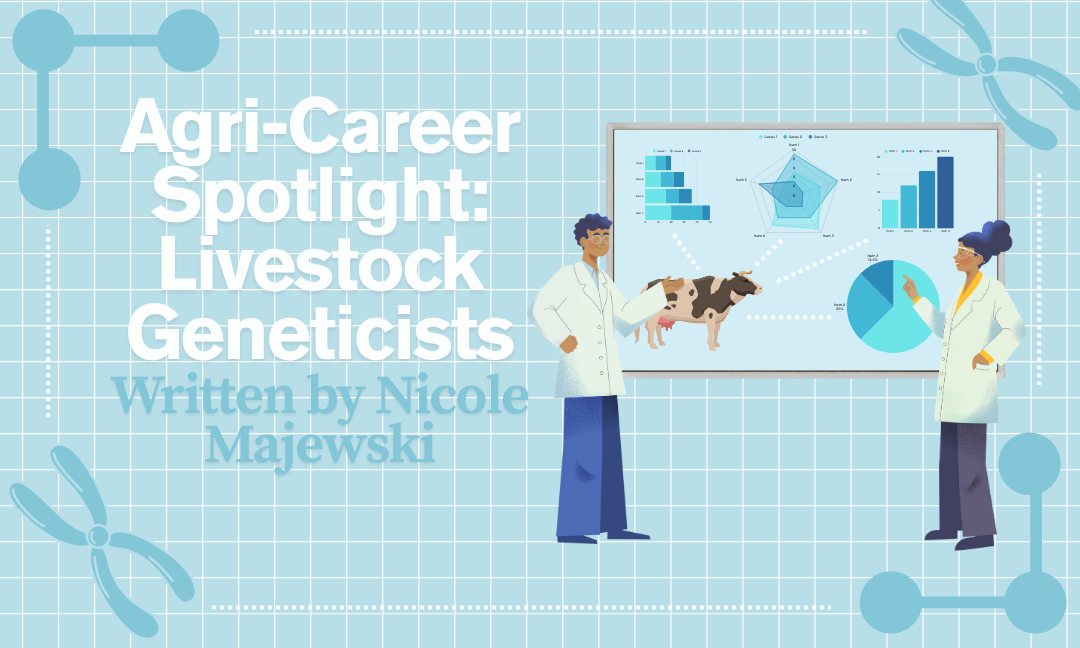Written by: Nicole Majewski
Edited by: Matthew Sarnavka
Designed by: Jedrick Asuncion
Published by: Rayna Almas

Dna. Original public domain image from Wikimedia Commons
The agricultural world is full of many fascinating pathways, from the final stages of food processing to the first gathering of all of those products on farms. But behind the scenes, there’s a lesser-known group of scientists working at the very foundation of it all, long before crops are harvested or animals are sent to market. What if I told you there are people dedicated to enhancing the very biology of everyday farm animals like chickens, cows, and pigs? Not only helping them produce more eggs, milk, or meat, but also to improve their overall health and well-being? Welcome to the fascinating world of livestock geneticists!
What is a livestock geneticist?
A livestock geneticist is a type of scientist who studies the genetic makeup of farm animals to understand how traits are inherited from one generation to the next, and how those traits influence the animals’ development, behaviour, productivity, and overall health.
But what exactly is the point of that? Their main goal is to identify genes that offer useful advantages—traits like disease resistance, high fertility, or faster growth. Once found, these genes can inspire specifically designed breeding programs that increase their presence in livestock populations. So imagine if, rather than laying one egg, chickens could lay two or three—that’s three times the harvest for farmers, with no extra effort on the chicken’s part, because all we’d have to do is adjust some genes to make them more than capable of that!
Livestock geneticists don’t just stop at one generation. Their findings are scalable, meaning they help ensure that these traits are passed on reliably to future animals as well. In simple terms, livestock geneticists decode the “blueprint” of animal life and use that knowledge to create real, positive change on farms.
And all of this isn’t just based on increasing animal productivity—it’s about health, too. Every gene has some sort of effect on how an animal functions, including its ability to fight off disease or adapt to new environments. Analysing these patterns could help us better understand how, and why, animals thrive or struggle under different conditions. Furthermore, genetic improvements can reduce the likelihood of those diseases occurring at all, ultimately helping animals thrive in a wider range of environments. These improvements can reduce the need for medication and improve the animal’s quality of life. This is also where livestock geneticists play a role in animal pharmacology—their work helps guide the development of better, more targeted treatments and medications for farm animals, which can also make these products more affordable and accessible for farmers.
What do livestock geneticists do?
The specific work of a livestock geneticist can vary greatly depending on their area of expertise—this is a diverse occupation, with many possible pathways. Some study all kinds of animals at once and use all of that information to make connections between them. This allows us to learn how certain genes affect different species. But their work can also be very specialised; they might only focus on a single trait, like reproduction, or a certain process, like wool growth in sheep or quantitative milk production in cows.
But regardless of focus, the core work of livestock geneticists is research. They collect and analyse genetic data to find patterns and predict how traits might appear in future generations. That data often leads to real-world applications, like advising farmers on how to breed animals with better health, stronger genetics, or higher-quality outputs.
Beyond research, livestock geneticists also write scientific papers to share their discoveries. These are published in journals or presented at conferences and meetings with agricultural companies or research institutions. Collaboration is a key part of the job, and scientific breakthroughs most often come when scientists from different teams and fields build upon the work of each other.
In terms of work setting, livestock geneticists typically divide their time between the lab and the field. In the lab, they use high-tech tools and specialised equipment to study DNA and run genetic tests. On the farm, they may observe animals directly, collect samples, assess how animals are responding to certain conditions, and discuss their recommendations with farmers and others who personally work with the animals.
How can you become a livestock geneticist?
If you’re passionate about science, animals, and making a meaningful difference in agriculture, becoming a livestock geneticist could be an extremely rewarding path! You’ll have the chance to improve the lives of animals on a much larger scale than almost anyone else.
To prepare for this exciting journey, you’ll need a strong background in science. After high school, you should pursue a bachelor’s degree in a related field such as biology, biotechnology, animal science, or agricultural science (such as dairy or poultry science). From there, you’ll typically need a master’s degree, and a PhD may be necessary if you want to conduct more advanced research or teach students at universities. Your educational route can definitely be flexible, and you should choose whatever better aligns with your interests, but it’s also important that whatever you pick is still relevant to your ultimate goal of working in livestock genetics!
Along with academic requirements, livestock geneticists need a mix of technical and people skills. You will need to be comfortable working with data and computer programs, because many parts of the job involve analysing and interpreting complex genetic information. Strong communication skills are equally important, though. You’ll often need to explain complex scientific ideas to farmers, write detailed reports, present at conferences, or even potentially teach students.
Why do livestock geneticists matter?
Livestock geneticists play a critical role in the future of sustainable agriculture. Their work leads to animals that are healthier, more resilient, and better suited to meet growing global food demands. Not only this, but as reducing greenhouse gas emissions becomes an increasing priority, their ability to reduce the environmental impact of farming by minimising required resources like feed, as well as promoting traits that reduce methane emissions and decrease waste, is becoming a staple in climate change activism. So, whether they’re working behind microscopes or out in barns, livestock geneticists are helping to reshape agriculture, one gene at a time!
References
https://m.agcareers.com/career-profiles/animal-geneticist.cfm
https://agexplorer.ffa.org/career/animal-geneticist/
Image References
https://medschool.usuhs.edu/ped/research/genomic-medicine/micap-postmortem-genetics

